Hands-on guy wants to re-democratize society
“It had a tremendous impact on the way that I viewed things, like differences in educational opportunities and outcomes,” said Stout. “It taught me a lot how just by virtue of the family I was born into and the community and neighborhood that I lived in, how I had certain advantages and opportunities growing up that a large number of people didn’t have.”
“In terms of my background, I really became interested in the progress of education and how we have a systemic issue that reproduces class and racial inequalities in our society.” — Dr. Mike Stout
Stout’s parents, a pharmacist and a nurse, inspired him to go into a career helping others. Instead of entering a health field as he originally intended, though, he has become an instrument for change by helping groups of people have a voice that ordinarily feel isolated or underrepresented.
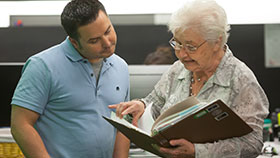 He’s a pioneer in the research of social capital – the concept that some resources are accessed more readily through connections and trust with other individuals. Throughout his career, he has repeatedly seen that a more diverse group of social connections – including friends, neighbors and colleagues from a variety of backgrounds – opens up more opportunities and encourages feelings of efficacy for all involved.
He’s a pioneer in the research of social capital – the concept that some resources are accessed more readily through connections and trust with other individuals. Throughout his career, he has repeatedly seen that a more diverse group of social connections – including friends, neighbors and colleagues from a variety of backgrounds – opens up more opportunities and encourages feelings of efficacy for all involved.
“College made me realize I was much more interested in political, social and economic forces in society and how those limit opportunities,” he said. “To be honest, if I would have gone to another undergraduate university that wasn’t located in a major city in the middle of kind of a big ghetto, I probably would have ended up continuing on with my med studies or getting into finance. Something that pays a little bit better than what I’m doing right now.”
Checking out Missourians’ civic health
Since 2010, a primary focus of research for Stout has been the production of the statewide Civic Health Index (the second was released in 2013, with another scheduled in 2015). This study looked at levels of participation in public forums, volunteer opportunities, neighborhood collaboration, voter registration, voter turnout and involvement in non-electoral political activities. These factors reveal a picture of how engaged citizens are in their communities and how much they invest in making their communities better.
“My work involves taking the expertise of faculty members, including myself, on campus and using it to provide information for local leaders, citizens and other stakeholders in the community to make better decisions about how we can collectively self-govern and increase democratic practice in community problem solving.” — Dr. Stout
To fulfill Stout’s goal of building a network of scholars and decision makers who advocate for collectively addressing community problems, he collaborated with scholars and practitioners from five other Missouri universities and Missouri Campus Compact for the 2013 report.
“What the Civic Health Index is examining is the health of the nonprofit sector – sometimes called civil society – and it shows us that the private, public and nonprofit sectors don’t operate in isolation. How our community is doing influences how representative our politics are. How our economic institutions are functioning determines how stable our communities are. How our economic sector influences our political sector determines the resources that flow through civil society, versus flowing through the private sector, and so on.”
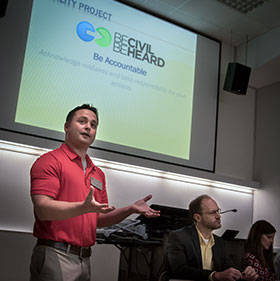 Stout, working along with the National Conference on Citizenship, has served as the main facilitator on this massive undertaking. It’s no big deal – he’s been busy his whole life, he laughed.
Stout, working along with the National Conference on Citizenship, has served as the main facilitator on this massive undertaking. It’s no big deal – he’s been busy his whole life, he laughed.
But one of the weaknesses of the report (scheduled to be released in September 2015 with analysis being conducted by the Center for Information on Civic Learning and Education (CIRCLE) at Tufts University) is that the data is collected at a national level and then filtered down to the state level.
“You really can’t – other than at the state level – dig down into what’s actually happening in different parts of the state, which limits the practical application of using this to inform policy.”
To make it more representative of what is occurring in individual communities, Stout designed a strategy to have the 19 local councils of governments in Missouri administer a version of the survey to its constituents. He’s certain that the results will be more meaningful to economic development specialists and policy makers in some of the less populated, more rural areas of the state.
‘I want to re-democratize our society’
He’s a hands-on type of guy, and he works hard to empower people often through grass roots efforts. In fact, one of his first jobs was as a phonics tutor to underrepresented minority children in Philadelphia.
Now, he teaches statistics and craves data that will back up his hypotheses. He knows it’s one of the ways that he can gather support across party lines on potential policy changes.
“The idea here is to really use data as a basis for beginning discussions in communities so that people are starting with the same assumptions,” he said. “Partisanship has become pretty bad in our society. But one area where liberals, conservatives, Republicans and Democrats do agree is that people should be empowered and have a voice in the direction of their own lives.”
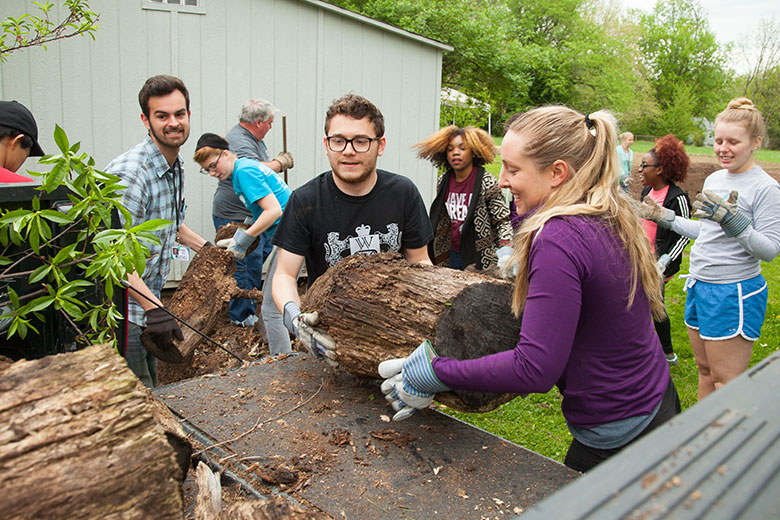
In 2010, Dr. Stout and several collaborators initiated the Ozarks Regional Social Capital Study to examine social capital and citizen participation in southwest Missouri. They found that people in the region tend to have many interpersonal connections, high levels of participation in voluntary groups (especially faith-based organizations) and high levels of trust in others. However, they also found that in the Ozarks there are relatively lower levels of civic engagement compared to the national average. “It’s influenced the way people talk about issues in the local community, has led – indirectly and directly – to new positions and resources in city government, and has highlighted civic engagement as a one of the four themes tying the 13 chapters of the city’s long range strategic plan together.”
‘No safe place for kids to play? Not a place to stay’
Feeling safe and valued starts at home, and in 2011, the Community Partnership of the Ozarks in Springfield, Missouri, joined a network of four other communities nationwide in establishing the Neighbor for Neighbor project. This initiative, supported by the Kettering Foundation and Everyday Democracy, is a community effort to minimize economic challenges by letting individual citizens voice concerns about a neighborhood and making positive changes. Currently, approximately 25 local community partners are involved to facilitate dialogues and find resources that these two poverty stricken neighborhoods can tap into to address issues like safety.
“We’re setting up opportunities for underrepresented groups to be involved in the community dialogue – it’s part of the Dialogue to Change program – about the best ways to frame and address problems. That is something everyone can get behind because it’s about empowering communities. It’s about empowering people. It’s about democratizing the community problem-solving process.”
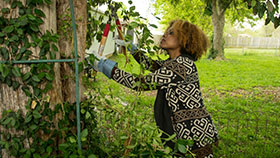 At its core, Neighbor for Neighbor, which Stout now helps to facilitate, brings people together to learn more about their neighbors and build trust – something Stout found through surveys of Springfield residents that is disproportionately low among the individuals in these particular neighborhoods. The neighbors who participate in the program talk about the issues plaguing their neighborhoods and are shown the resources at their disposal in order to make their neighborhoods feel safer – whether it be adding street lighting, building community gardens or cultivating green space for a park.
At its core, Neighbor for Neighbor, which Stout now helps to facilitate, brings people together to learn more about their neighbors and build trust – something Stout found through surveys of Springfield residents that is disproportionately low among the individuals in these particular neighborhoods. The neighbors who participate in the program talk about the issues plaguing their neighborhoods and are shown the resources at their disposal in order to make their neighborhoods feel safer – whether it be adding street lighting, building community gardens or cultivating green space for a park.
Although Neighbor for Neighbor has gained some footing, it’s a tough sell, noted Stout. The individuals in the neighborhoods are transient, so they typically don’t stay involved long. They also feel quite alienated from community leaders and socially isolated.
“Even if they wanted to get involved, they often don’t see the point because they don’t think it would make a difference. They also have the least diverse connections to social economic organizations and individuals,” he said. “It turns out, that those are significant obstacles to getting people involved in initiatives where we want to empower people.”
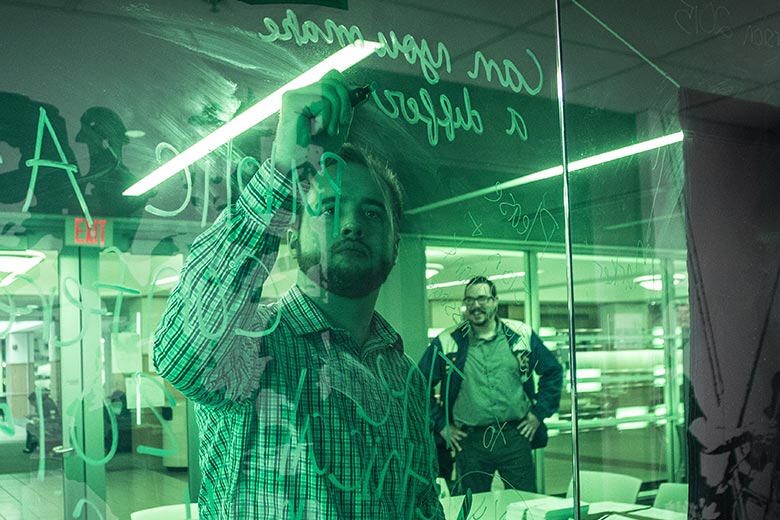
Mapping conflict
One of Stout’s earliest studies in the field of sociology further influenced his career path. Stout, an undergraduate student at the time, collaborated with a graduate student at Temple University to study 10 years of data on reported hate crimes in Philadelphia. They then geo-coded each incident to see how the crimes were dispersed geographically.
“What we found is the areas with the highest amount of racial and ethnic conflict were happening on these border lines where white neighborhoods meet black neighborhoods and where Jewish neighborhoods meet working class white neighborhoods,” he said. “That got me really interested in kind of the social structure of conflict and how this related to housing, segregation and all of these other things.”
The data was originally collected by the Philadelphia Commission on Human Relations, and his report was later distributed to elected officials and other civic leaders in Philadelphia, which pleased a young Stout. It also helped to solidify in him that one goal in sociological study should be to influence policy changes.
Another outcome of this study still creeps up and interferes with the momentum he tries to make with the Neighbor for Neighbor initiative to this day.
“People who try to get ahead and move out of those bad situations or into better situations are often faced with prejudice and discrimination and all of these things that are kind of beyond their control,” he said.
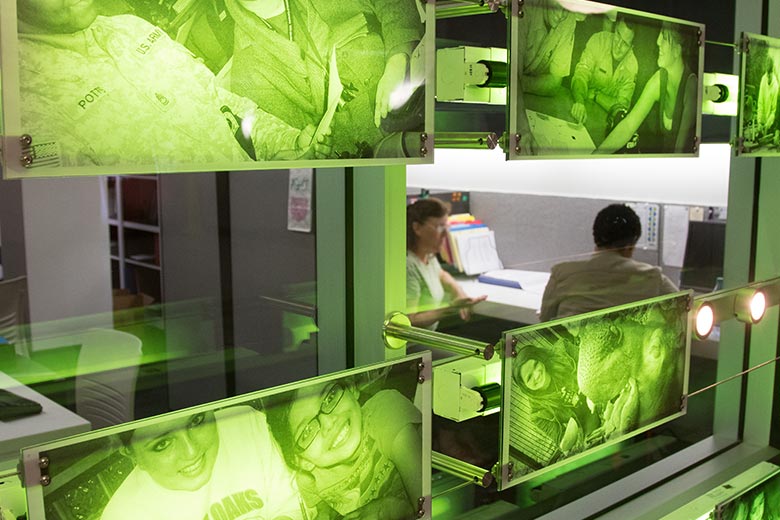
‘It’s very serendipitous the way that it worked out for me’
When Stout was looking for a position in the academic world, he wanted to find a place where he could make a difference. At the same time, Missouri State’s sociology department was shifting from a more traditional, academic sociology program to what is termed a public sociology program, where students take the classroom theories out into the community and get involved in issues they care about. The first step to that transition was incorporating community based research and engaged scholarship into the tenure promotion guidelines, which allowed Stout to teach and get involved.
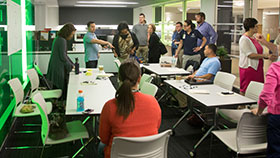 He got so involved, that in fall 2014, Missouri State University’s Center for Community Engagement was established and Stout was named its first director. In a short time, he has made huge strides on building partnerships for the Center, securing funding and gaining momentum behind projects and studies that will be done – all for the greater good.
He got so involved, that in fall 2014, Missouri State University’s Center for Community Engagement was established and Stout was named its first director. In a short time, he has made huge strides on building partnerships for the Center, securing funding and gaining momentum behind projects and studies that will be done – all for the greater good.
“The Center for Community Engagement here at Missouri State is the first such partner of the National Conference on Citizenship in the country. What I’m really trying to do is – locally, regionally, statewide and nationally – weave Missouri State as one of the central nodes for research and practice on social capital and civic engagement in the country. That’s kind of the bigger goal.”
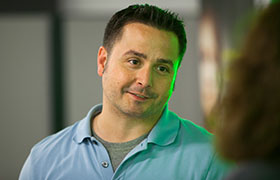 After Dr. Stout completed his dissertation, Racial and Social Economic Inequality and Political Participation, he decided to expand beyond electoral politics. He realized that so many decisions and agents of change happen outside of the scope of elections.
After Dr. Stout completed his dissertation, Racial and Social Economic Inequality and Political Participation, he decided to expand beyond electoral politics. He realized that so many decisions and agents of change happen outside of the scope of elections.


This is a very informative article about outstanding contributions that Missouri State University is making in Springfield and beyond. Mike Stout is an exceptionally talented, energetic, and collaborative professional who Missouri State is fortunate to have. Dr. Stout is practicing indeed what he professes–public sociology at its best.
I had the opportunity to work with Dr. Stout when I was with the Institute for School Improvement at Missouri State from 2008-2012. My unrealized intention was that Dr. Stout would be an integral part of a team of collaborators to extend the good work initiated in the ECHO Project and continued with the Community School model in the Springfield Public Schools. My hope is that these kinds of partnerships will flourish in the future and draw together the close connections between education, democracy, and community health.
Best wishes to the many good folks in the Springfield area involved in these essential community building and improvement efforts.
Great article about the work of a very talented individual!
I have had Dr. Stout in a few if my sociology classes. He is an excellent instructor who has passion for the subjects he teaches. He encourages students to participate in their communities, and takes an active role in activities on campus. I consider myself lucky to have had the opportunity to participate in his classes. Keep up the Good work Dr. Stout!